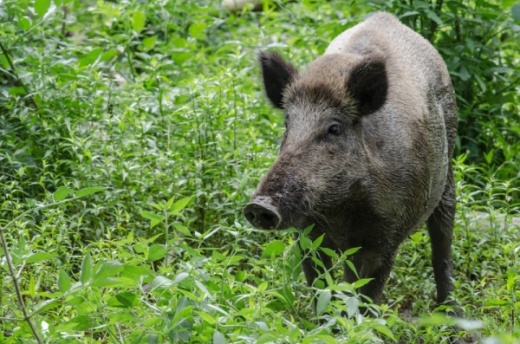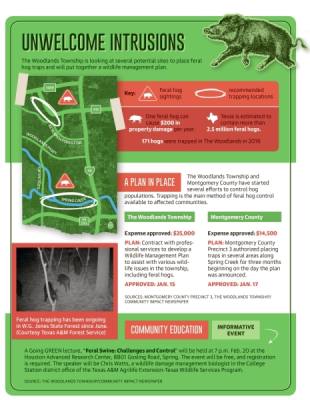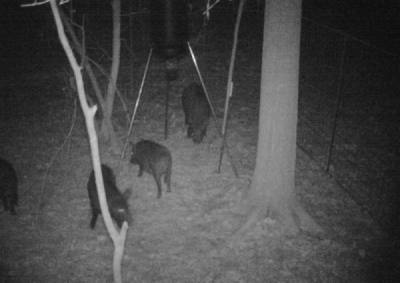Residents in the Grogan’s Point neighborhood came before The Woodlands Township board of directors in December and January to voice concerns about the hogs.
Linda Estrada, a Grogan’s Point resident, said in January the animals were harming the local ecosystem and disrupting residents’ ability to enjoy the community.
“The hogs stand and stare as if they have no fear of humans,” she said.
She was among the several dozen residents who attended the Jan. 15 board of directors meeting at which township officials approved $25,000 to engage a wildlife management consultant to develop a comprehensive control plan.
However, Chair Gordy Bunch said he believes the problem is one that does not rest solely on the township’s shoulders.
“I do think that we will do what we can do to move things forward, but we are going to have to put pressure on the county to take a more proactive approach,” he said.
Bunch said the responsibility for controlling feral hogs falls on landowners, and some of the areas in which the hogs are present are owned by Montgomery County or other entities, meaning that the township cannot take action on those properties.
County efforts
Two days after that discussion, Montgomery County Precinct 3 Commissioner James Noack announced he had contracted with a professional wildlife removal company to trap feral hogs in several areas on Spring Creek.
The three-month program will cost $14,500, and the traps were scheduled to be placed on the same day, according to the county.
The traps were placed on county property and will be relocated as necessary throughout the three months of the program, according to a statement from Noack.
“I have walked the trails that the hogs are using, witnessed the damage firsthand and have been working with officials to determine this prudent step,” Noack said. “That is consistent with actions taken with other nuisance wildlife.”
A Precinct 3 news release stated Noack has been communicating with departments such as the Texas Parks & Wildlife Department to determine more long-term solutions.
“Commissioner Noack does not believe it is in the best interest of his constituents to wait for more meetings, consultants and bureaucracy before providing relief to Precinct 3 residents,” according to the news release.
Ongoing efforts
Meanwhile, several residents from Windsor Hills neighborhood said conditions have improved after the construction of a fence at points where the hogs were gaining admittance.
Rob Miller, a resident of Windsor Hills and the president of its homeowners association, said the township partnered with the neighborhood to put up the fence there.
“We have not had any more feral hog activity,” he said. John Powers, the assistant general manager for community services in The Woodlands, said two information sessions on the issue are planned for the public in February to provide educational information about the hogs.
Other measures the township will employ will include working with governmental and private entities to determine future action, Powers said.
According to information presented at The Woodlands Township meeting, there are more than 2.5 million feral hogs in Texas.
Connor Murnane, a forester with the Conroe District of the Texas A&M Forest Service, said trapping for feral hogs in W. G. Jones State Forest, located in The Woodlands near the affected communities, has been ongoing since June.
“That’s when we started noticing issues,” Murnane said. “[The trapper] has two traps in the forest right now. ... You have to slowly implement these traps; it takes some time getting them used to it.”
Hogs captured in the forest are taken to a licensed holding facility and processed into food, which is donated, he said.







